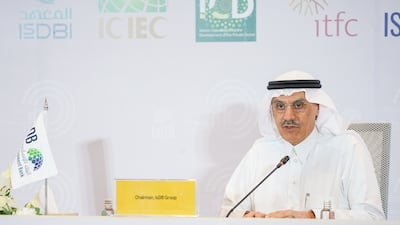Jeddah-based Islamic Development Bank (IsDB) has approved $5.4 billion in development financing for projects in 24 member countries as it seeks to bridge funding gaps in critical sectors.
The bank’s board gave the go ahead for funding at its annual meetings in Jeddah to address challenges that hinder growth in the South Hemisphere for projects in sectors including food security, health, education, agriculture, small and medium enterprises, education and humanitarian assistance, the multilateral lender said on Sunday.
“Over the past four days, we have reviewed development-related issues with our partners and member countries,” said Muhammad Al Jasser, IsDB president and group chairman.
“We discussed the current situation and the future of the IsDB Group, reaching a number of important decisions in the process.”
The IsDB, which was founded in 1975, aims to foster economic development and social progress of member countries and Muslim communities in non-member countries.
The bank’s main function is to provide various forms of development assistance for poverty alleviation, human development, forging economic co-operation, and enhancing the role of Islamic finance in the social and economic development of member countries, according to its corporate profile.
Reforming multilateral development banks is a key priority to fast-track the disbursement of sustainable development financing, amid the global climate and economic crises, experts said at World Economic Forum meeting in Davos in January.
The discussion came against the backdrop of the UN reporting a $4 trillion financing gap annually for its Sustainable Development Goals.
Mohamed Al Hussaini, Minister of State for Financial Affairs, headed the UAE delegation that participated in IsDB’s annual meetings.
The UAE is considered one of the most developed countries in the Islamic finance sector and is keen to exchange experiences and provide support for efforts aimed at developing the system, he said.
“The future of social finance depends largely on digitisation and the participation of the private sector,” Mr Al Hussaini said.
“The UAE launched pioneering initiatives that contribute to providing a range of payment channels to facilitate the flow of funds for social development, as well as enhancing the participation of the private sector through capacity-building programmes.”
The IsDB board approved funding worth more than $558 million for six projects focused on supporting inclusive growth and infrastructure development in member countries, the statement said.
As the trustee of the Afghanistan Humanitarian Trust Fund, the lender also signed seven agreements worth $8 billion for inclusive sustainable development projects in Afghanistan, which include grants from the King Salman Humanitarian Aid and Relief Centre.
IsDB and its international development partners also unveiled the second phase of its Lives and Livelihoods Fund, which aims to mobilise resources that support economic development across 32 less privileged member countries, it said.
The multilateral lender has committed $325 million in concessional loans to the fund, bringing total grant contributions to $200 million.
The bank also unveiled its revamped member country partnership strategy documents for Uzbekistan, Pakistan and Niger, which will activate the group’s country engagement framework to support multilateral development and growth.
The four-day annual meetings, held under the theme “Partnerships to Fend off Crises”, focused on the importance of collaboration in addressing challenges faced by IsDB's 57 member countries.
The event served as a platform for global leaders, policymakers and key stakeholders to come together and discuss critical development issues.


